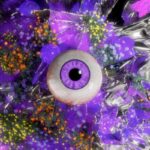WARNING: The following contains spoilers for My Hero Academia Season 5 Episode 22, "Sad Man's Parade," now streaming on Funimation, Crunchyroll and Hulu.
The name of My Hero Academia's power system has been largely taken for granted since it was introduced. Episodes usually open with a sequence explaining how most characters were born with special gifts called Quirks, but almost no further thought was given to the word's etymology in the anime.
However, Season 5 Episode 22 sees Tomura Shigaraki battle Re-Destro, where the latter reveals these meta abilities were not always called Quirks, shedding more light on their history and the term's surprisingly dark origin.
While defending the Meta Liberation Army's conviction to Shigaraki, Re-Destro divulges a piece of in-world MHA history that expands on the context of the term "Quirk." He tells the story of an unnamed woman from long ago when meta abilities had only begun to appear among humans and were still rare. This woman gave birth to a child who happened to have a meta ability.
In her time, superpowered people were feared and discriminated against. Even knowing the reality she'd face should she choose to raise her child, the mother continued to shield him from abuse, showering him with love and attempting to change the public's views about these powers. She referred to it as her child's quirk and appealed to everyone to help make the world a safer place for people like her son.
Her campaign started to pick up steam but unfortunately, this put her in the crosshairs of groups opposing those with meta-abilities. They assassinated her in an effort to silence her, but her cause had already created a lasting impact. Since these powers were becoming more commonplace, governments referred to her argument as they sought to modify how society worked. They classified the abilities as another part of their holder's personality, their Quirk, and that is how the name became official in My Hero Academia's world.
Re-Destro went on to state that the actual policies the governments implemented were far from the woman's ideals. They banned regular citizens from using their Quirks, seeing them as a danger to society. The suppression of Quirks led to a radicalization of the woman's son, who styled himself Destro and revolted against his country's laws, seeing them as an insult to his mother's legacy. Destro spent his life teaching Quirk liberation but unfortunately wasn't able to realize his dream during his lifetime.
Destro's descendants kept his spirit alive, continuing to teach liberation for generations until they reached the numbers that make up the current Meta Liberation Army. With Destro's direct descendant Re-Destro as its leader, they're poised to raze the current society to the ground and build a new one where Quirks will be able to be used freely.
This reveal, apart from giving some much-needed background to the Liberation Army, also shows how fascinating Quirks really are in My Hero Academia. They're not just random superpowers, but another way for people to express their individuality. Quirks even go so far as to affect their holder's personalities, although it's more apparent in some cases than others. Bakugo's explosive nature is much like his fiery Quirk, while Shoto Todoroki's aloofness could be attributed to his two contrasting Quirks canceling each other out.
It also gives Re-Destro a new sense of danger he didn't have before. With the weight of a revolution hundreds of years in the making on his back, there's no telling the lengths he'll go to finally achieve this dream.
About The Author

